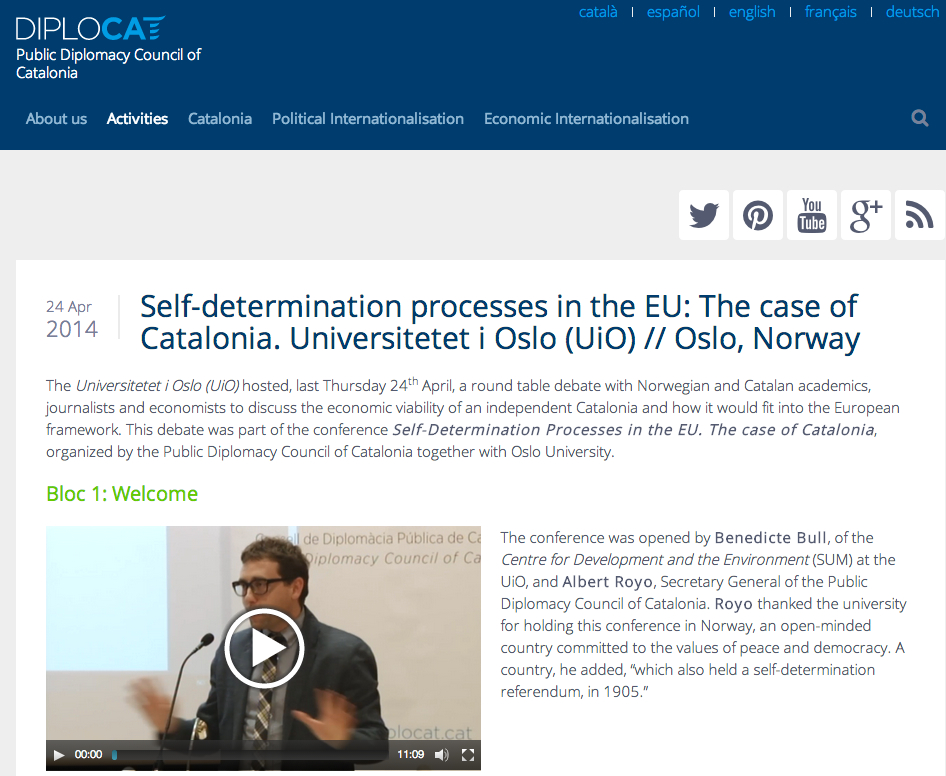06.05.2014 - 00:21
The Universitetet i Oslo (UiO) hosted, last Thursday 24th April, a round table debate with Norwegian and Catalan academics, journalists and economists to discuss the economic viability of an independent Catalonia and how it would fit into the European framework. This debate was part of the conference Self-Determination Processes in the EU. The case of Catalonia, organized by the Public Diplomacy Council of Catalonia together with Oslo University.
Bloc 1: Welcome

The conference was opened by Benedicte Bull, of theCentre for Development and the Environment (SUM) at the UiO, and Albert Royo, Secretary General of the Public Diplomacy Council of Catalonia. Royo thanked the university for holding this conference in Norway, an open-minded country committed to the values of peace and democracy. A country, he added, “which also held a self-determination referendum, in 1905.”
Bloc 2: What has been happening in Catalonia recently?
 00:0014:20
00:0014:20
The conference continued with the participation of Øyvind Østerud, professor at the Department of Political Science at the UiO, and Vicent Partal, journalist and editor of theVilaweb news service, who explained recent events in the Catalan self-determination process from Norwegian and Catalan points of view. Østerud has compared the cases of Catalonia and Scotland and has made his bet that the Spanish Government will end up accepting the referendum in Catalonia, as “the right arguments are those of dignity and democracy”.
 00:0018:33
00:0018:33
Partal has also referred to the UK and has pointed out that while the constitutions of neither the UK nor Canada allow independence, both governments did understand that there was a political problem and looked for a solution through dialogue. He also said that Catalans are ready to discuss and negotiate about everything except the right to vote, and has firmly denied the existence of an ethnolinguistic split in Catalonia.
Bloc 3: Self-determination processes in the UE
 00:0027:46
00:0027:46
The second round table dealt with the question of self-determination processes within the EU. Chris Lord, professor at the ARENA Centre for European Studies of the UiO, and Ivan Serrano, researcher in Secession and Creation of New States at the IN3-UOC research centre of the Open University of Catalonia (UOC) took part. Lord has claimed that “consensual continuity of both Catalonia and Spain in the EU is in the interest of everybody, as there are huge economic interests involved” and has mentioned the weakness of the Spanish banking system. According to him, an independent Scotland could cause a precedent in the EUfor consensual continuity of both states.
 00:0023:54
00:0023:54
Serrano has stated that international law doesn’t give a clear regulation of unilateral secession, “which is the last option when no other solutions are given”. In his opinion, from a normative point of view, a democratic state should allow the possibility to discuss this kind of issues.
Bloc 4: Medium-sized Economies
 00:0020:46
00:0020:46
Finally, the last round table discussed the implications of these political processes for small and medium-sized economies, and their viability in Europe, within the EU or the EFTA. The participants included: Jaume Ventura, senior researcher at CREI and professor at the Pompeu Fabra University (Barcelona) and the Barcelona GSE, who placed the Scottish and Catalan political processes within the global economy, and explained the economic viability of medium-sized economies with a foreseeable role in the EU or EFTA.
 00:0015:27
00:0015:27
Øivind Bratberg, post-doctorate at the Department of Political Science of the UiO, who talked about the Scottish case.
 00:0018:59
00:0018:59
And, finally, Xavier Cuadras, associate professor at the Department of Businesses and Economy at Pompeu Fabra University and director of the Escola Superior de Comerç Internacional (ESCI-UPF), who remarked that an independent Catalonia would be completely viable from an economic point of view.
This conference forms part of the series of conferences on Catalonia’s “right to decide” organized by the Public Diplomacy Council of Catalonia in prestigious European universities. The first event was held at Sciences Po París in June 2013, followed by subsequent acts in London, Seville, Uppsala (Sweden), Toulouse (Languedoc), Lisbon, Utrecht, and Santiago de Compostela. Future conferences are planned for Berlin and Geneva.
Founded in 1811 as the first in Norway, the University of Oslo is the country’s leading public institution of research and higher learning.




